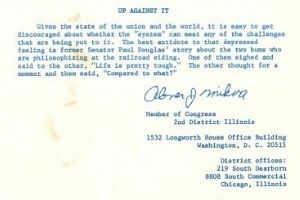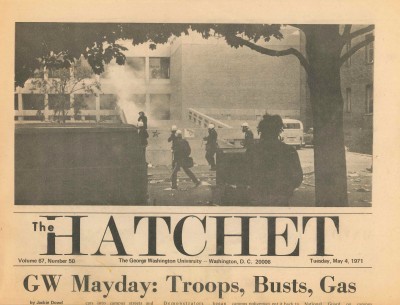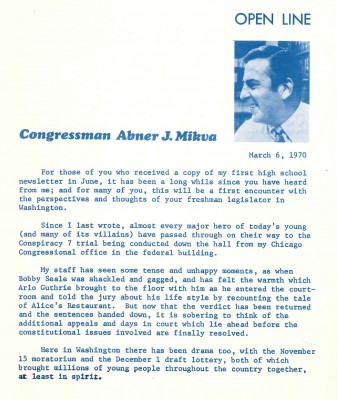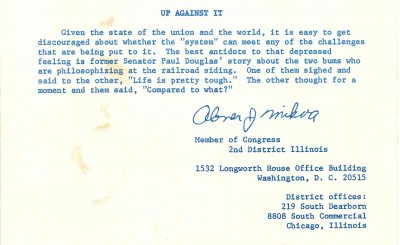Compared to What?

Blog post by Executive Director Marvin Pinkert. To read more posts from Marvin click HERE.
It goes without saying that America has had more glorious “4th of July” weeks than in 2016. Rather than fireworks, our eyes were riveted on gunfire – grisly videos of both citizens and police under attack. In the midst of this cauldron of hatred and fear we lost two major voices that had railed against silence in the presence of inhumanity: Nobel Prize winner Elie Wiesel and Pulitzer Prize winning Journalist, Sydney Schanberg. It only compounded our sense of loss.
I noticed that the events of the last ten days have also sent people scrambling for historic comparisons. I have seen articles in several major media sites comparing current events to those of the late 60s. For me this isn’t a historic era, but rather part of my lived experience. I chose to escape the constant drumbeat of awful news for an hour going into the basement to sort through my memorabilia from college. Among the posters for anti-war rallies and flyers for protests of every kind I ran across a school newspaper from my freshman year at GW. It’s banner headline screamed of the violence that came to campus 45 years ago. My recollection is that I locked myself in my room, covered my windows with masking tape, and still found myself coughing from tear gas after our dorm was subjected to gas canisters dropped from helicopters.

But in shuffling through the papers I also discovered another unexpected (and timely) perspective.
In all the chaos of the last week, the passing of Judge Abner Mikva on July 4 received modest coverage. But for me it was a significant event.
Readers of my blog posts know that I grew up on the South Side of Chicago at a time when Mayor Daley (the first Mayor Daley) and the “machine” ran not only the city itself but all political representation of the city. Chicago may be the “second city”, but it takes a backseat to no one in the category of political corruption. In the 1960’s we were represented in Congress by Barratt O’Hara – a machine politician who was a Spanish-American War veteran and who had served as Lieutenant Governor of Illinois during WWI. There is nothing like a first political infatuation and at age 14 I went door-to-door for Abner Mikva as he attempted to fight the machine.
Mikva lost. But in a rising tide of anti-Vietnam War sentiment, he finally made it into office in 1968 and when I entered college at George Washington University I went to Capitol Hill to volunteer. They assigned me to the addressograph machine – an essential tool in the era before mail merge software. The job itself was not that exciting but I spent a fair amount of my free time pursuing my interests as a political junkie – running from office to office collecting signatures of the famous legislators of my youth.
As I grew older, I lost much of my ardor for political activism but I continued to admire Congressman and then Judge Mikva from a distance. Mikva eventually became Chief Judge of DC Court of Appeals in the 1990s (the position now held by my classmate Merrick Garland). He would encourage a young man named Barack Obama to enter politics and eventually receive the Presidential Medal of Freedom for his lifetime of achievements.

So there in the box with my political autograph collection (including Eugene McCarthy’s on the back of a hastily grabbed West Point application) – I found this newsletter from Abner Mikva directed at high school students. I may have saved this from my days working the addressograph machine.

I turned to the back page and my jaw dropped. It reminded me that 45 years ago when many of thought our nation was doomed and the future had never been darker – we were wrong and Abner Mikva was right: “compared to what?”
